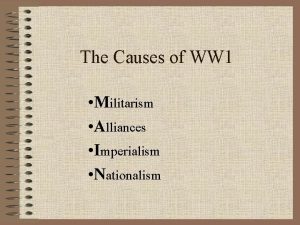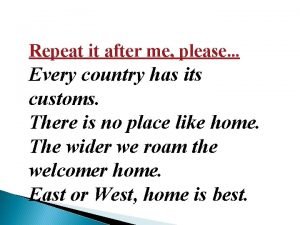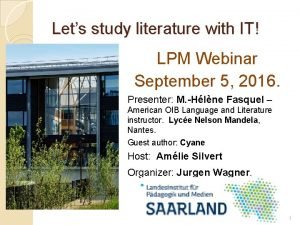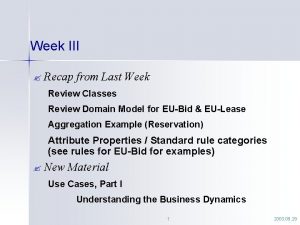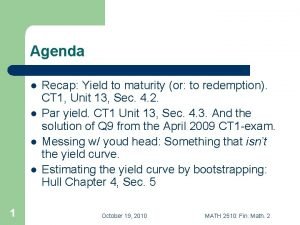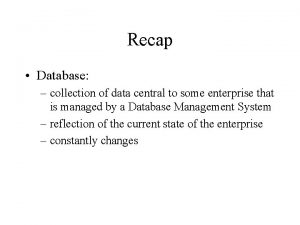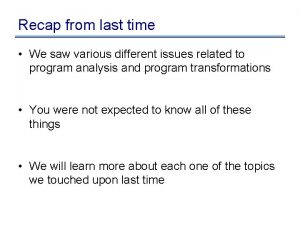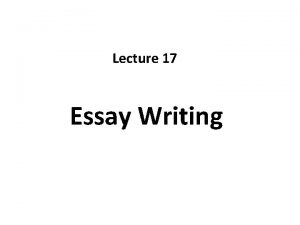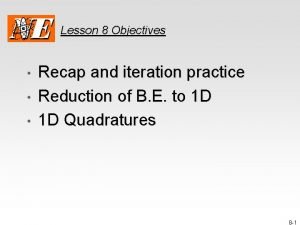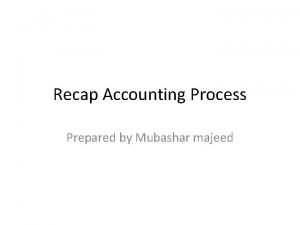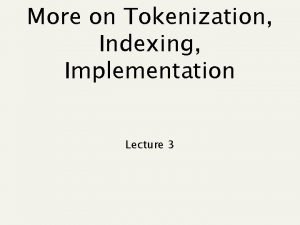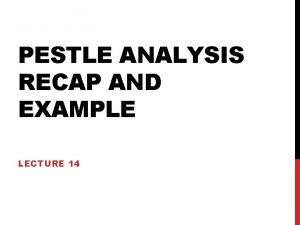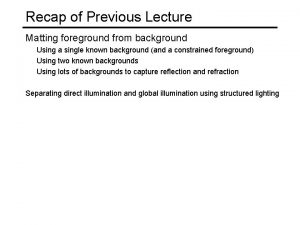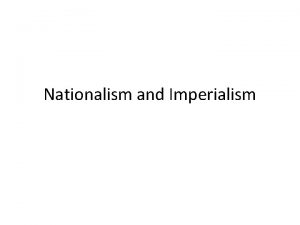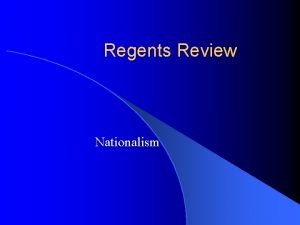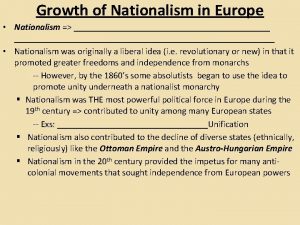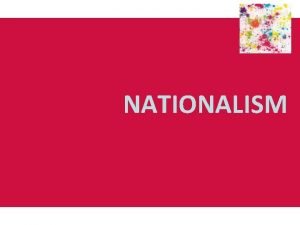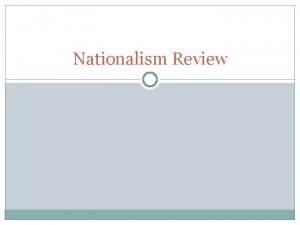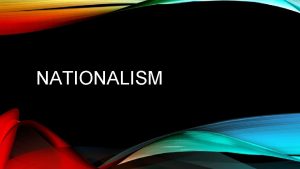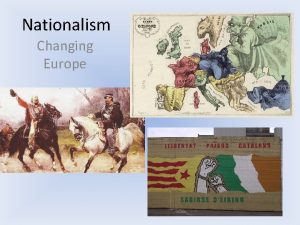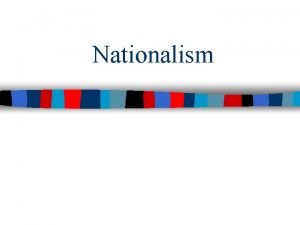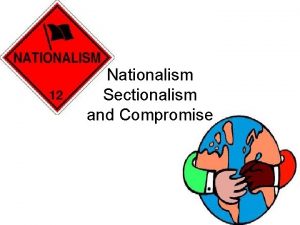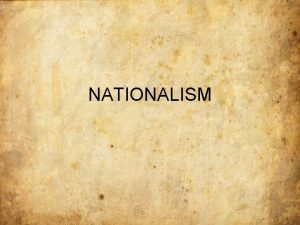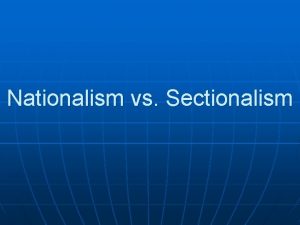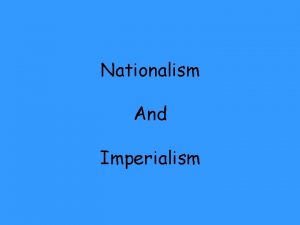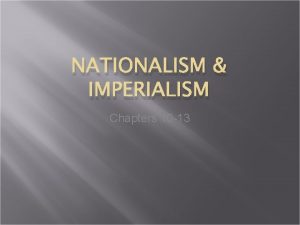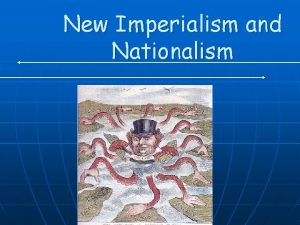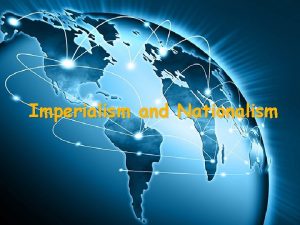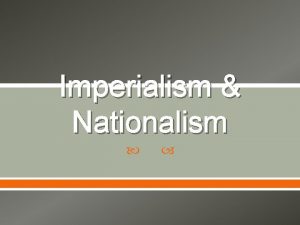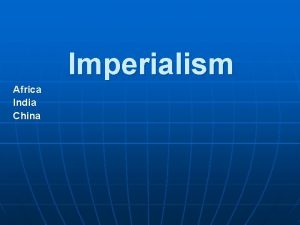IR Recap Nationalism Imperialism IR Recap After the







































































- Slides: 71

IR Recap, Nationalism, Imperialism

IR Recap After the political revolutions of the 1700’s and early 1800’s, another type of revolution began l The Industrial Revolution - the shift, beginning in England during the 18 th century, from making goods by hand to making them by machine. l

Roots of the Industrial Revolution Begins in Britain when wealthy buy up farm land improve farming techniques l New larger farms, called enclosures were created l l On these, farmers discovered better ways to farm l Jethro Tull invented the seed drill which allowed for crops to be planted in a straight line

Roots of the Industrial Revolution Crop Rotation – the process where a farmer changes the crop they grow in a field to keep the land healthy l Farmers began selectively breeding livestock which made cattle healthier and stronger. l

Roots of the Industrial Revolution Industrialization – the process of developing machine production of goods l Factors of production – the resources needed to produce goods and services that the Industrial Revolution required l l Water and coal to fuel machines l Iron ore to construct machines l Rivers for easy and cheap transportation l Harbors to encourage international trade

Inventions Spur Industry Flying Shuttle – doubles the work a weaver can do in a day l Spinning Jenny – a wheel that allows a worker to spin 8 spools of yarn at a time l Waterpower made both of these inventions faster l Factories – a building in which machines are set up to produce goods l

More Inventions Steam Engine – James Watt develops a better, more efficient steam engine and teams with entrepreneur Matthew Boulton to sell it l Entrepreneur – a person who organizes, manages, and takes on the risk of a business l

Transit American, Robert Fulton placed a steam engine on a boat and built the Clermont, the first steam boat. l In England, canals were built to improve and quicken transportation l Roads were improved by adding crushed rock over a layer of big rocks for drainage l l Stay out of the mud!

Railroads became the most important method of transportation during the Industrial Revolution l Why? l l Railroads can move heavy materials quickly and cheaply

Urbanization In the late 1700’s more and more people moved to cities l This is called Urbanization l Cities are built near water l Factories are also built near water l People move to cities for jobs in factories l

Cities l Urbanization – city building and the movement of people to cities l Occurs because factories are built near cities l People move there for jobs l England sees a boom in cities l London is most important industrial city l Manchester is northern center of growth


Living & Working l Due to the speed that cities grew, services were not always available l No sewers, trash collection, cramped housing Life expectancy in London for a factory worker was 17, 38 for rural farmers l Factories were dark and dangerous l l People worked 14 hours a day, 6 days a week l Conditions were poor, many workers injured or killed

Class Systems in England Upper Class – Nobility (kings, etc. ) l Middle Class – skilled workers, professionals, businessmen, wealthy farmers l Lower Class – Factory workers, laborers, and poor farmers l l Working Class – people who worked in factories l Felt mistreated

Good Effects of I. R. l l Nations became wealthy Created Jobs Raised the standard of living Created demand for educated workers to help with design l l l Items that were luxuries become common Cities became better places to live Living and working conditions improved

Spread of I. R. l U. S. had the same resources that Britain had. l U. K. tries to keep the US out of trade during the War of 1812 l As a result, the US begins industrializing Samuel Slater builds a spinning machine from memory l Moses Brown uses Slater’s machines to open a factory in Rhode Island l

U. S. l l l Lowell, MA – first fully mechanized cloth factory, named after factory owner. Women went to work because they could earn more doing factory work than in other jobs. In the second half of the 1800’s, industry boomed in the US l l l Railroads Investment Invention

The Corporation Companies require money to build l Corporations are formed l l Corporation – a business owned by stockholders who share in its profits but are not personally responsible for its debts l Stock – certain rights of ownership

Basically You lend a company money l That money gets you a SHARE of ownership l When the company makes a profit, you earn a percentage of that profit based on how many shares of stock you own. l

Europe The French Revolution & Napoleon will disrupt the Industrial Revolution l Belgium will use its resources to become the early European leader l Germany will follow the British model and will bring English workers to Germany l Germany will build a lot of railroads to help speed up their growth l

Impact Widened the gap between rich and poor globally l Led to exploitation of colonies for resources l Europe became the strongest economy in the world l Led to economic and social reform l

Philosophies of Industrialization l Laissez-Faire – letting industry and business set working conditions without interference l Government should not interfere in business l Lower taxes and tariffs l Will help promote wealth

Adam Smith l Adam Smith – defends the idea of a free economy in the book “Wealth of Nations” l Liberty grants economic progress l Three laws of Economics l Law of self-interest – people work for their own good l Law of Competition – competition forces people to make a better product l Law of supply and demand – good are produced at the lowest possible price to meet demand.

Capitalism – the economic system in which the factors of production are privately owned and money is invested in business ventures to make a profit l Many capitalist thinkers were against a minimum wage and improved working conditions. l l Felt that would increase the costs of production

Utilitarianism – theory that government actions are useful only if they promote the greatest good for the greatest number of people l Government should work to improve the lives of people because it brings up the general well-being of a nation l

Socialism – the people own the factors of production and operate for the welfare of all l Government should plan the economy to improve the lives of everyone l Public ownership would help workers l Socialism holds an optimistic view of human nature l

Capitalism vs. Socialism Capitalism l l l Individuals and businesses own property and the means of production. Progress results when individuals follow their own self-interest. Businesses follow their own selfinterest by competing for the consumer’s money. Each business tries to produce goods or services that are better and less expensive than those of competitors. Consumers compete to buy the best goods at the lowest prices. This competition shapes the market by affecting what businesses are able to sell. Government should not interfere in the economy because competition creates efficiency in business. Socialism l l l The community or the state should own property and the means of production. Progress results when a community of producers cooperate for the good of all. Socialists believe that capitalist employers take advantage of workers. The community or state must act to protect workers. Capitalism creates unequal distribution of wealth and material goods. A better system is to distribute goods according to each person’s need. An unequal distribution of wealth and material goods is unfair. A better system is to distribute goods according to each person’s need.

Karl Marx German philosopher who introduces “Marxism” in The Communist Manifesto l Society is divided into warring classes l l Upper Class - Haves l Middle Class/Bourgeoisie – Haves l Lower Class/Proletariats – Have Nots l The upper classes owned everything, the lower class worked

Communism l l l Capitalism would destroy itself due to the workers being angry over the wealth of a few owners of production Workers would seize the factories and share the wealth Would lead to a classless society Communism – complete socialism in which the means of production – all land, mines, factories, railroads, and businesses would be owned by the people No more private ownership

Unions & Reform Workers became active in politics and pressed for reforms l Unions – voluntary labor associations l l Unions speak for all workers in a trade l Demand better pay and working conditions l If these demands are not met, they go on Strike – a refusal to work l After some time, unions earn rights for workers

Other Reforms l l l Child labor laws – U. K. & U. S. created laws limiting the hours a child could work Women Labor Laws - U. K. & U. S. created laws limiting the hours a woman could work Abolition of slavery l l Britain – 1833 US – 1865 Puerto Rico – 1873 Brazil – 1888

Other Reforms Better working conditions for women l Woman’s right to vote l l Women l 1919 l fought for the right to vote – US Free Public education for all children


Japan Modernizes Japan had not traded or interacted with others during the I. R. l 1853 Commodore Matthew Perry (US) goes to Japan and opens trade l Treaty of Kanagawa – Japan and the U. S. agree to trade and allow U. S. ships to refuel l

Meiji Reforms Japans leaders were upset that the nation began to trade, which was seen as bowing down to Western powers l Japanese Emperor Mutsuhito forced the Tokogawa shoguns to step down ending 800 years of rule, begins the Meiji Era l

Meiji Japan The Meiji Era rulers decide that to compete and counter western influence was to modernize l Begin purchasing modern weapons, building railroads l Dress in western clothing l Japan began to trade with the rest of the world and became richer l

Japan Expands Japan builds the largest, strongest army in Asia l Japan’s national pride led them to begin to expand l 1894 – Japan breaks a treaty and attacks Korea l l Japan wins the war with Korea and China and conquers Korea, gaining Taiwan as a colony

Russo – Japanese War In 1904 Japan attacks Russian ships in Manchuria (China) beginning the Russo. Japanese War l Japan wins the war and forces Russia out of Manchuria l Japan erodes the Korean government and eventually takes it over and imposes annexation – total control of a country by another country. l


Nationalism l Nationalism is the most powerful idea of the 19 th century (1800’s) l The belief that people should be loyal mainly to their nation – that is, to the people with whom they share a culture and history – rather than a king or empire l This idea led to the building of Nationstates

Three types of Nationalism l Unification l Mergers of politically divided but culturally similar lands l Separation l Culturally distinct group resists being added to a state or tries to break away l State-building l Culturally distinct groups form into a new state by accepting a single culture

Austrian Empire Break-up in the 1800’s of the Austrian empire is due to political and social reasons as well as attacks from the east l Nationalism played a large role in destabilizing the region l


Germany l 1815: German nation-states unify to form the German Confederation l Austria and Prussia both tried to dominate this group l 1848, Germans force a constitutional convention l Prussia is the best represented here because they are the most similar to Germany with a large ethnic German population


Wilhelm I l Prussian ruler who becomes head of state in Germany l Supported by Junkers – conservative members of Prussia’s landowning class l Otto von Bismarck l Prime Minister l Realpolitik – term for “tough power politics” with no room for idealism.

Prussian Empire l Bismark uses his position to centralize power l Take regions from Denmark l Use the military victories to provoke Austria into attacking them l Use their advanced military training to defeat Austria

Franco – Prussian War Prussia (Germany) provokes a war with France over a perceived insult l France loses l Wilhelm I is pronounced Kaiser (king) l Declares his empire the Second Reich l l Holy l Roman Empire is the First Reich Shifts the balance of power in Europe to Germany & England l It will remain like this until after WWII

China & The West l Before 1793 China had refused ambassadors from European countries l l In 1793, the Qing emperor allowed the British to trade with them l l They could get everything they needed by themselves Still didn’t need Europeans for trade Europeans wanted to find a good that the Chinese would need l British introduced Opium – habit forming drug


The Opium War l The Chinese became addicted to Opium l l Emperors asked Britain to stop importing the drug l l Britain refused China declared war against Opium trade and the British l l 12 million by 1835 Naval war that the British won easily Treaty of Nanjing l Gave the British the port of Hong Kong and extraterritorial rights l Non-citizens were not subject to Chinese law in certain ports

China l Rebels tried to overthrow the government in the Taiping Rebellion l l At the same time, Europeans were putting pressure on China for goods and deals l l Fails due to poor organization and in-fighting Internally, some Chinese wanted Western style reforms Dowager Empress Cixi led China in some educational reforms, diplomatic service, and military

China l Other nations tried to establish spheres of influence in China (and Japan) l One country holds power over another’s government, trade, and investments l U. S. was afraid of others interfering in China and declared the Open Door Policy l Chinese trade must be open to all countries


Chinese Nationalism l Qing emperors saw international interaction in China as a threat l Tried to modernize to keep up with the rest of the world Chinese people became frustrated with the government l Dowager Empress overthrows her own son and undoes some of his reforms l

The Boxer Rebellion l l Poor Chinese people resented foreigners given privileges Some get together and form a secret society called the Society of Righteous and Harmonious Fists l l They marched on Beijing shouting “Death to foreigners” l l Called “Boxers” due to the shape of the hats they wore Easily defeated by foreign armies Chinese government decides that it must reform l Decide to restructure it’s gov’t by 1917


Imperialism l Imperialism – the seizure of a weak country by a strong country l The stronger country will dominate politics, economics, and social life l Africa – largely independent before 1800’s l Europeans began trading with the Africans in the 1400’s l Mainly for slaves

Types of Imperialism l Colony l. A country or territory governed internally by a foreign power l Somaliland l was a French Colony Protectorate l. A country or territory with its own internal government but under the control of an outside power l Niger River Delta was a British Protectorate

Types l Sphere of Influence l An area in which an outside power claims exclusive investment or trading privileges l Liberia l under the Sphere of Influence by America Economic Imperialism l An independent but less-developed country controlled by private business interests rather than other governments l Dole Company in Hawaii

Control Indirect Control l Reliance upon existing political leaders l Those leaders ruled by authority of the Colonial power and with their laws l Direct Control l Colonies were unable to handle the complexities of government l Paternalism – Provided for peoples needs, but did not give them rights l Assimilation – Populations would become like the colonial culture by only learning that culture l

Africa & The Congo l During the 1800’s European “explorers” ventured into the heart of Africa l l l King Leopold of Belgium claimed the Congo for Belgium l l Their reports sparked interest in the nations European rulers wanted the resources there Said it was to introduce Christianity and end slavery Other European nations wanted access to Africa and began claiming land

Why Colonize? l Europeans believed they were superior to people in other nations l Racism – the belief that one race is superior to another l Social Darwinism – the false belief that races advanced due to genetics benefits l Missionaries encouraged colonization l Convert more people to Christianity

How Could they Do It? l European countries were able to manage a large empire because l Superior weaponry l Machine l The gun steamboat allowed for fast transport to and from the colonies l Development of Quinine – cure for malaria

Europe is Divided 1885 – 14 European countries meet to divide Africa l Berlin Conference – set rules for colonies in Africa l l Divided Africa l No African representation at the conference l Borders drawn based on European desires and resources l No care given to who lives in a place at a time

Africa l Many Europeans believed that Africans would purchase goods made from African materials l Did l not happen Europe still wanted resources from Africa l Used previously mentioned justification for continuation of colonies

British l The Dutch had settled in South Africa l Known l Took as Boers land established huge farms l The British took over South Africa, the Boers disagreed with British policies l When Gold and diamonds were found in South Africa many came to make their fortune l Boers attempted to keep them out l When this failed, they blamed the British

Boer War l Boers launched a war against the British l Commando raids & guerrilla tactics by Boers l British burnt Boer farms and put women and children into disease filled concentration camps l Black South Africans fought mainly for the Boers, captured and put into camps l The British eventually won l Joined with the Boers in forming the Republic of South Africa

French Indochina l French had been involved in Southeast Asia since the 1600’s l Helped the Nguyen dynasty come to power l In the 1840’s an anti-Christian emperor had French missionaries killed l The French used that as an excuse to invade and conquer Vietnam l Added Laos and Cambodia l Called French Indochina

French Indochina l French used Direct Rule l l Key positions in government were filled by Frenchmen Increased rice production l l Infrastructure improved l l Railroads, harbors, communication Mostly benefitted the French l l Most of it was exported However education and health for natives improved also Migration from all of Asia occurred l Has led to religious and ethnic difficulties to today

 Nationalism imperialism militarism
Nationalism imperialism militarism Militarism alliances imperialism nationalism
Militarism alliances imperialism nationalism After me after me after me
After me after me after me John 14 1
John 14 1 Causes of new imperialism
Causes of new imperialism New imperialism vs old imperialism
New imperialism vs old imperialism Logbook recap example
Logbook recap example 60 minutes recap
60 minutes recap Let's recap
Let's recap Recap
Recap Recap from last week
Recap from last week Normative ethics
Normative ethics What is price matching
What is price matching Romeo and juliet act 1 summary
Romeo and juliet act 1 summary Recap poster
Recap poster Ytm recap
Ytm recap Recap database
Recap database Let's recap
Let's recap Horizontal axis
Horizontal axis The crucible act 1 discussion questions
The crucible act 1 discussion questions Saw recap
Saw recap Public transportation essay
Public transportation essay What is the purpose of an iteration recap?
What is the purpose of an iteration recap? Recap accounting
Recap accounting Black box recap
Black box recap Differentiation recap
Differentiation recap Dihybrid punnett square
Dihybrid punnett square Recap indexing scans
Recap indexing scans Shawshank redemption movie summary
Shawshank redemption movie summary Act ii the crucible
Act ii the crucible Briefly recap
Briefly recap Ldeq recap
Ldeq recap Recap intensity clipping
Recap intensity clipping Example of recap
Example of recap Fractions recap
Fractions recap Recap introduction
Recap introduction Recap background
Recap background Sample script for recapitulation
Sample script for recapitulation The great gatsby chapter 8 analysis
The great gatsby chapter 8 analysis Lets have a recap
Lets have a recap Quá trình desamine hóa có thể tạo ra
Quá trình desamine hóa có thể tạo ra Vẽ hình chiếu vuông góc của vật thể sau
Vẽ hình chiếu vuông góc của vật thể sau Công của trọng lực
Công của trọng lực Thế nào là mạng điện lắp đặt kiểu nổi
Thế nào là mạng điện lắp đặt kiểu nổi Hát kết hợp bộ gõ cơ thể
Hát kết hợp bộ gõ cơ thể Dot
Dot Vẽ hình chiếu đứng bằng cạnh của vật thể
Vẽ hình chiếu đứng bằng cạnh của vật thể độ dài liên kết
độ dài liên kết Voi kéo gỗ như thế nào
Voi kéo gỗ như thế nào Các môn thể thao bắt đầu bằng tiếng chạy
Các môn thể thao bắt đầu bằng tiếng chạy Sự nuôi và dạy con của hươu
Sự nuôi và dạy con của hươu điện thế nghỉ
điện thế nghỉ Một số thể thơ truyền thống
Một số thể thơ truyền thống Thế nào là sự mỏi cơ
Thế nào là sự mỏi cơ Trời xanh đây là của chúng ta thể thơ
Trời xanh đây là của chúng ta thể thơ Ng-html
Ng-html Số.nguyên tố
Số.nguyên tố Thiếu nhi thế giới liên hoan
Thiếu nhi thế giới liên hoan Tia chieu sa te
Tia chieu sa te Các châu lục và đại dương trên thế giới
Các châu lục và đại dương trên thế giới Thế nào là hệ số cao nhất
Thế nào là hệ số cao nhất Sơ đồ cơ thể người
Sơ đồ cơ thể người Tư thế ngồi viết
Tư thế ngồi viết Cái miệng bé xinh thế chỉ nói điều hay thôi
Cái miệng bé xinh thế chỉ nói điều hay thôi đặc điểm cơ thể của người tối cổ
đặc điểm cơ thể của người tối cổ Cách giải mật thư tọa độ
Cách giải mật thư tọa độ Tư thế worm breton là gì
Tư thế worm breton là gì Bổ thể
Bổ thể Tư thế ngồi viết
Tư thế ngồi viết ưu thế lai là gì
ưu thế lai là gì Thẻ vin
Thẻ vin Thơ thất ngôn tứ tuyệt đường luật
Thơ thất ngôn tứ tuyệt đường luật

